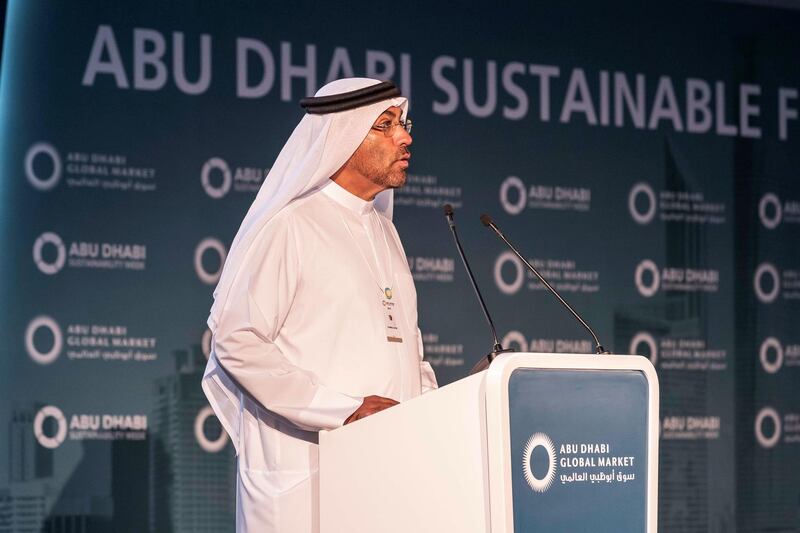The financial sector can play a key role in funding the needs of sustainable development in the Middle East and North Africa region, which already has seen $163 billion (Dh598bn) invested in clean energy, according to the chairman of Abu Dhabi Global Market.
“Unprecedented level of investment is necessary to develop sustainable energy sources, environment …. to achieve long-term sustainability and prosperity for all,” Ahmed Al Sayegh, who is also a UAE minister of state, said on Wednesday at the Abu Dhabi Sustainable Finance Forum.
“To achieve the right results, we need to harness the energy and resources of both public and private investment [for sustainable development]."
The UAE, the second-biggest Arabian Gulf economy, has been actively addressing the UN sustainable development goals, which have seen the socially responsible investing market grow 200 per cent in the last decade to almost $23 trillion in value globally. The G20 finance ministers and the central bank governors in 2016 agreed to find ways to raise about $90tn in funds over the next 15 years to be invested to achieve sustainable development targets.
UAE’s Vision 2021 and its Green Agenda already call for using resources to support green projects and develop innovative financing tools. Masdar, UAE’s clean energy firm that has invested more than $8.5bn in global projects, has also taken several initiatives including announcing its green revolving funding facility in October last year. First Abu Dhabi Bank, the top UAE lender by assets, has also set aside $10bn for financing green businesses over the course of 10 years, Mr Al Sayegh noted.
The oil producers in the six-member economic bloc of GCC, in particular, have increasingly pivoted towards developing renewables capacities to meet power generation needs in order to free up more oil for export. The UAE, which was the earliest in the region to develop a renewables strategy, is targeting increasing the contribution of clean energy to 50 per cent by 2050. The strategy is expected to see investment of around Dh600bn by the targeted timeline to bring on stream additional renewable capacities.
“The financial community is now comfortable lending to renewable energy projects especially those with long-term, predictable cash flows administered by credit-worthy counterparties and governed by transparent regulation such as [that of] Saudi Arabia and the UAE,” Mohamed Al Ramahi, the chief executive of Masdar told delegates attending the forum.
__________
Read more:
[ Saudi energy minister: Renewables unlikely to displace global demand for oil ]
Saudi Aramco to issue $10bn bond in 'a few weeks', says energy minister
Sheikh Mohamed bin Zayed meets world leaders before Abu Dhabi Sustainability Week
Abu Dhabi Sustainability Week to push climate change to top of national agenda
Abu Dhabi embraces sustainability in #WeAreCommitted campaign
__________
“All these developments are good news for the entire Middle East and North Africa, where an estimated $50bn to $100bn will be needed to meet the region’s requirements in the next decade or so."
The signs from the global debt markets are encouraging as green bond issuance surpassed $180bn in 2018 and has grown by 50 per cent in each of the past three years while green loans amounted to $40bn in 2017, a year-on-year increase of 20 per cent, he noted.
The scale of the financing is huge, but the developers of renewable projects are still reluctant to use green funding tools due to the higher cost of funding, Paddy Padmanathan, chief executive of Saudi Arabia’s Acwa Power said at the event.
“Green financing still has the problem of higher cost of funding,” he said, adding that it is presently financing its developments through various sources.
“Green financing does expand the pool of liquidity, so yes, there is that advantage."
ADGM, which is among the fastest growing regional financial hubs, on Wednesday also launched its Sustainable Finance Agenda. Some 25 key public and private entities and institutions have also committed to the Abu Dhabi Sustainable Finance Declaration to jointly advocate sustainable finance and investments and to foster positive, economic, social and environmental impacts for the long-term growth of the country’s economy.
ADGM’s agenda revolves around four key pillars including Integrating sustainability into the regulatory framework to become a hub for sustainable finance activities. ADGM will spearhead the adoption of “harmonised taxonomies and certification measures” for the classification of a broad range of sustainable finance products, applicable across the UAE, ADGM said in a statement.
Building cooperation with national and international stakeholders, cultivating communications, knowledge and awareness; and developing a sustainable finance ecosystem in ADGM are among the other key objectives of the financial hub’s agenda.







